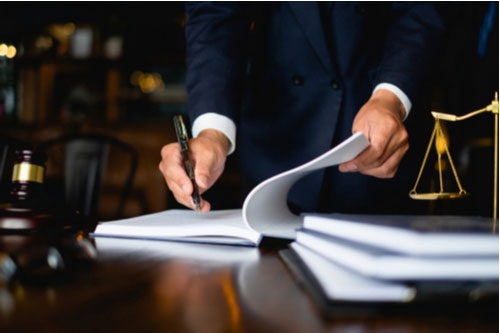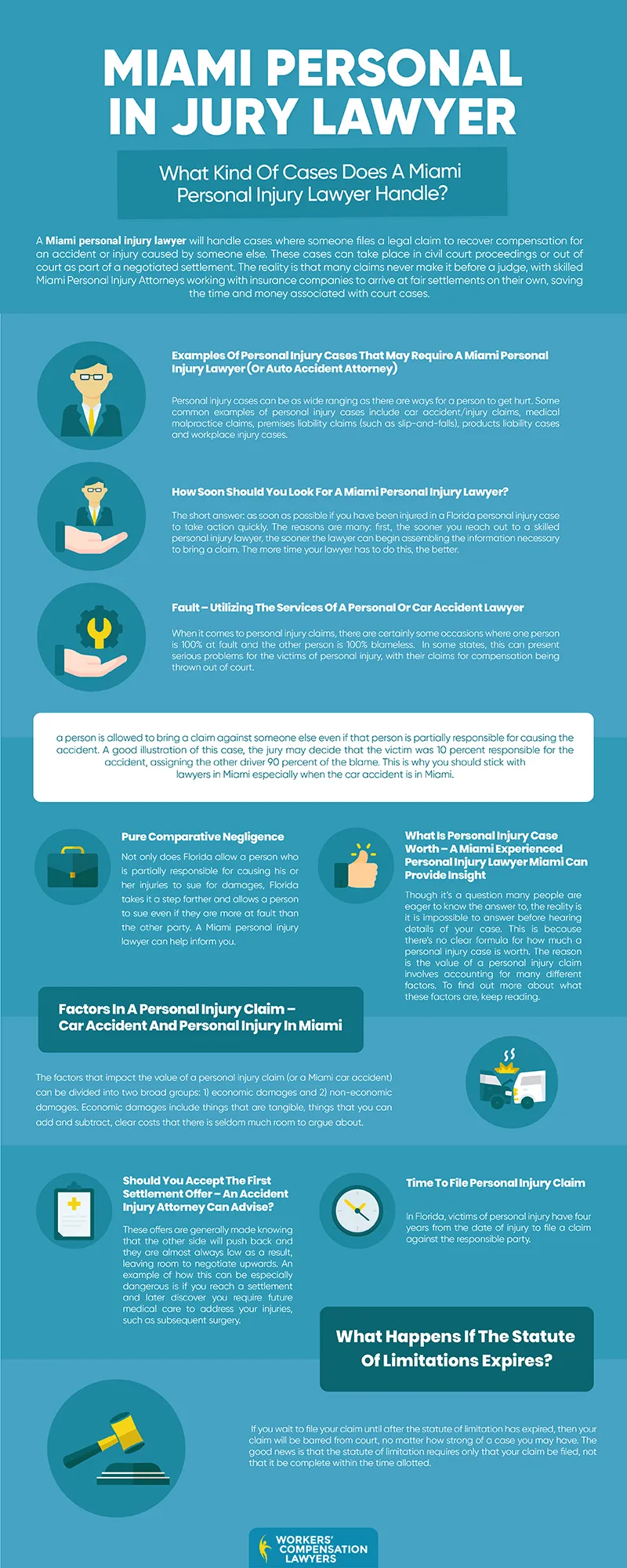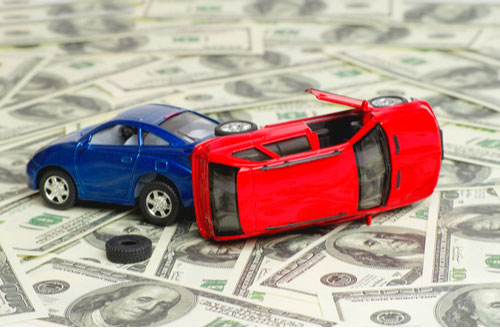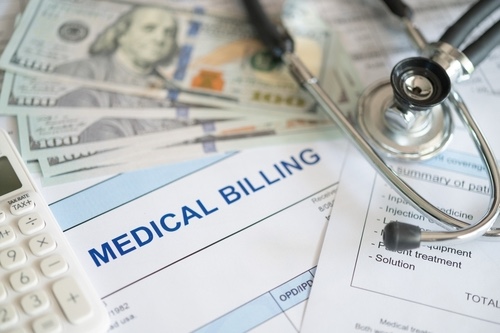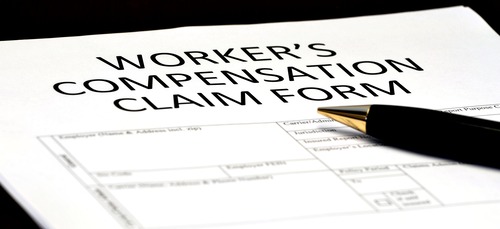Miami Personal Injury Lawyer | South Florida Injury Rights
- Personal Injury
Florida Injury Law Firm: Experienced Miami Personal Injury Lawyers Fighting for Your Rights
Our Miami personal injury lawyers help victims file a legal claim to recover compensation for an accident or injury caused by someone else’s negligence. These cases can take place in civil court proceedings or out of court as part of a negotiated settlement. Florida personal injury cases can be as wide-ranging as there are ways for a person to get hurt. Some common examples of personal injury cases include car accident injury claims, medical malpractice claims, premises liability claims (such as slip-and-falls), product liability cases, and workplace injury cases.
Here at Miami Lawyers 360, our team is experienced in handling car accident, personal injury, and workers’ compensation cases. If you were hurt due to another’s negligence, contact our Miami, Florida personal injury law firm for a free consultation.
Table of Contents
How Soon Should You Contact a Miami Personal Injury Lawyer?
The short answer is as soon as possible. It is critically important if you have been injured in a Florida personal injury case to take action quickly. The reasons are many. First, the sooner you reach out to a skilled personal injury lawyer, the sooner the lawyer can begin assembling the information necessary to bring a claim.
It takes time to assemble medical records, obtain witness statements, and conduct an investigation into the circumstances of the accident. The more time your lawyer has to do this, the better. It is also important to move quickly because evidence has a tendency to disappear. The sooner your lawyer can start looking, the greater the odds that witnesses or photos or videos are still around and can still be preserved. The longer you wait, the less likely this is.
Finally, the sooner you reach out to a personal injury attorney in Florida, the sooner you can stop worrying about the statute of limitation. Your lawyer will then be aware of the case and any important deadlines and will ensure that these deadlines are all met with sufficient room to spare. It becomes one less weight on your shoulders.
How Is Liability Determined in a Personal Injury Case?
In order to hold the responsible party liable and recover compensation, your Miami personal injury lawyer must prove the four elements of negligence:
- Duty of Care: This means the at-fault party had a responsibility to help keep you from harm. An example is how drivers have a duty to obey traffic laws.
- Breach of Duty: The responsible party did not uphold the duty of care.
- Causation: The negligent behavior caused your injury.
- Damages: You suffered damages, such as financial losses and suffering.
Can I Still File a Lawsuit if I’m Partially at Fault for My Injury?
When it comes to personal injury claims, there are certainly some occasions where one person is 100% at fault and the other person is 100% blameless. However, this is not always the case.
In some states, this can present serious problems for the victims of personal injury, with their claims for compensation being thrown out of court. For instance, in a place like North Carolina, if a plaintiff is found to be even 1% responsible for the accident that resulted in their injuries, the entire claim will be thrown out of court.
Thankfully, that is not how things are done in Florida. That’s because Florida is one of 13 states to have adopted a system based on comparative negligence. This means that a person is allowed to bring a claim against someone else even if that person is partially responsible for causing the accident.
A good illustration of this is if there is a car accident caused by a reckless, speeding driver, but where the victim was found to have turned in front of the driver without a working turn signal. In this case, the jury may decide that the victim was 10 percent responsible for the accident, assigning the other driver 90 percent of the blame. In that case, if the jury determines the case to be worth $100,000, the plaintiff will collect $90,000, with his or her share of responsibility reduced from the ultimate damage award.
Florida Injury Law Firm: Pure Comparative Negligence
Not only does Florida allow a person who is partially responsible for causing his or her injuries to sue for damages, but the state also takes it a step farther and allows a person to sue even if they are more at fault than the other party. Florida uses a pure comparative negligence system, which means a person can recover damages even if he or she is 99 percent at fault.
It’s important to remember that in these cases, the amount the person is entitled to recover will be reduced by his or her degree of fault. This is why it’s best to work with a skilled personal injury lawyer who knows how to handle your case.
What Is My Personal Injury Case Worth?
Though it’s a question many people are eager to know the answer to, the reality is it is impossible to answer before hearing details of your case. This is because there’s no clear formula for how much a personal injury case is worth. Many factors go into determining how much you can receive, so the best course of action is to have an experienced personal injury lawyer evaluate the specifics of your case.
What Damages Can I Recover in a Personal Injury Claim?
There are three types of damages that victims can be awarded depending on the circumstances of the case.
Economic Damages
Economic damages include things that are tangible, things that you can add and subtract, clear costs that there is seldom much room to argue about. Examples of these kinds of damages include hospital bills, doctor’s bills, rehab expenses, property damages, time off work, etc.
Non-Economic Damages
Non-economic damages, on the other hand, can’t be calculated financially. These include things like pain and suffering and diminished earning capacity. It can be hard to know exactly what these things are worth and, as a result, it is far more common for the parties in a personal injury claim to argue about them.
Punitive Damages
Unlike the previous two types of damages, punitive damages are not intended to compensate the victim. They are only used in some cases to punish the at-fault party for gross negligence or intentional misconduct.
Personal Injury Law | Should You Accept the First Settlement Offer?
The reality is that many claims never make it before a judge, with skilled Miami Personal Injury Attorneys working with insurance companies to arrive at fair settlements on their own, saving time and money associated with court cases.
Though every case is different, it is almost always a bad idea to accept anyone’s first settlement offer. These offers are generally made knowing that the other side will push back and they are almost always low as a result, leaving room to negotiate upwards. Another problem with jumping to accept an offer too early is that you may settle a case before you understand the extent of your injuries. An example of how this can be especially dangerous is if you reach a settlement and later discover you require future medical care to address your injuries, such as subsequent surgery.
If the settlement has already been reached, it cannot be reopened to account for these new expenses, you will simply be out the cost on your own. Given this, it is crucial that you have an experienced Florida personal injury attorney review your case and any settlement offer. Our Miami personal lawyers will have the skill and experience to know whether the offer is fair and help you make an informed decision about whether accepting the offer makes the most sense for you.
What is the Deadline to File a Personal Injury Claim in Florida
Timing, when it comes to a personal injury claim in Florida, is critical. This is because the statute of limitations sets a deadline for plaintiffs to file lawsuits. In Florida, victims of personal injury have four years from the date of injury to file a claim against the responsible party. However, this can vary based on the facts of the case and the type of injury involved. In cases of wrongful death, the family of the victim only has two years to bring a claim. For more information regarding statute of limitations, click here.
What Happens If the Statute of Limitations Expires?
Statutes of limitation are serious and exist for a reason so that people cannot bring claims years or even decades after the event that caused them. If you wait until after the statute of limitation has expired, then your claim will be barred from court, no matter how strong of a case you may have. The good news is that the statute of limitation requires only that your claim be filed, not that it be complete within the time allotted.
Contact Our Miami Personal Injury Law Firm
If you were injured due to another’s careless or reckless actions, our team at Miami Lawyers 360 is here to help. We are committed to providing outstanding results, personalized attention, and uncompromising integrity. You can reach us anytime 24/7. Contact us for your free case review!
